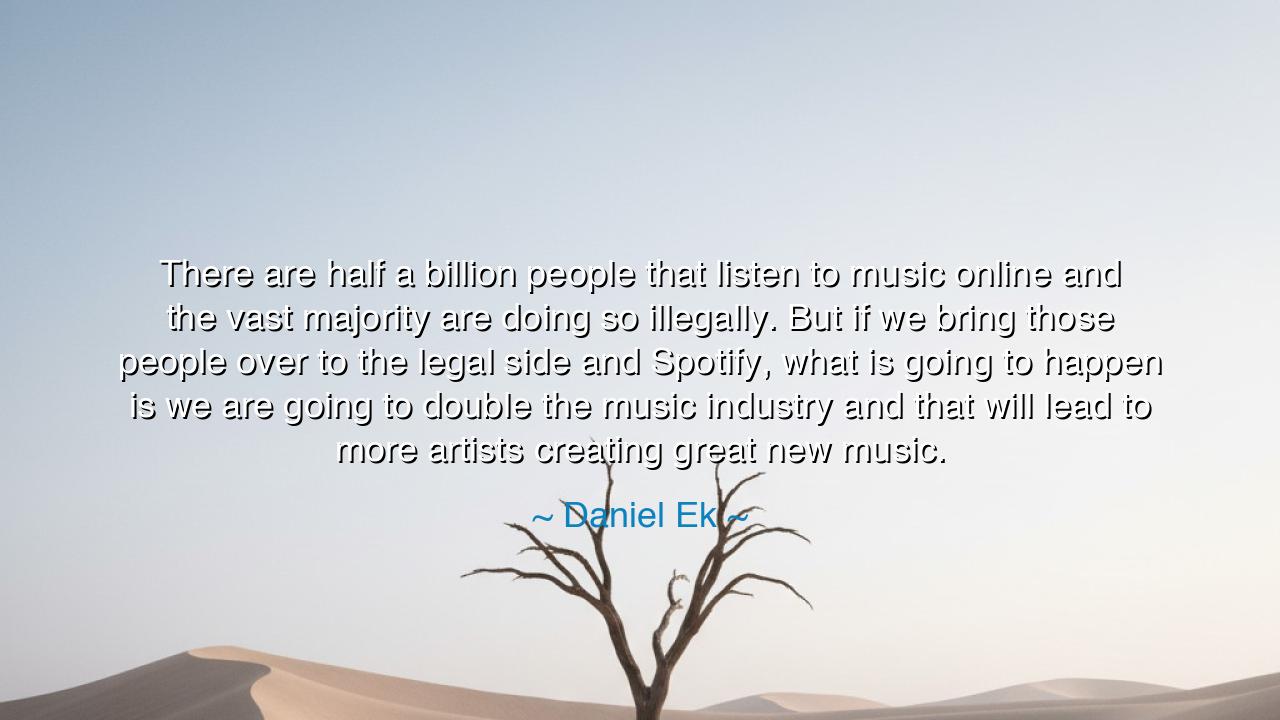
There are half a billion people that listen to music online and
There are half a billion people that listen to music online and the vast majority are doing so illegally. But if we bring those people over to the legal side and Spotify, what is going to happen is we are going to double the music industry and that will lead to more artists creating great new music.






Hear, O lovers of music and keepers of culture, the words of Daniel Ek: “There are half a billion people that listen to music online and the vast majority are doing so illegally. But if we bring those people over to the legal side and Spotify, what is going to happen is we are going to double the music industry and that will lead to more artists creating great new music.” These words rise not only as a vision of commerce, but as a prophecy of renewal for art itself. For Ek speaks of a truth: that art cannot survive on theft, that creation withers when its fruits are plucked without payment, and that the future of music rests on the covenant between artist and listener, sustained by fairness.
The ancients knew this lesson well. The bards of Greece sang for their supper, and kings who loved poetry gave gifts to the poets so their songs would endure. But when art is consumed without reward, the artist starves, and the music dies with him. Ek’s words confront the age of piracy, when millions took songs without giving anything in return. The illegal listener enjoyed the art, but left the creator unrewarded, and so the stream of creativity was in danger of running dry. The legal side, as Ek calls it, is more than obedience to law—it is the lifeline of the artist, the soil from which new beauty grows.
Consider the story of the printing press. When it was first born, books multiplied like never before. But without structures to protect authors, their words were copied endlessly, and many lived in poverty while others profited from their genius. Over time, copyright was born—not to shackle knowledge, but to ensure the writer was rewarded, and thus able to write again. In the same way, Spotify was conceived not merely as a business, but as a bridge: to turn chaos into order, piracy into partnership, theft into support, so that the music industry might not shrink, but flourish.
The origin of Ek’s words lies in the late 2000s and early 2010s, when digital piracy had gutted the music world. Record sales fell, musicians struggled, and the industry seemed on the brink of collapse. Spotify emerged as a new model: a streaming service that gave listeners abundance while ensuring artists received payment. Ek’s vision was simple but profound—if the half billion who took music for free could be turned into lawful participants, the very size of the industry could double, and artists everywhere would find strength to create.
The meaning of his teaching is greater than music alone. It speaks to the eternal law of creation: that when you honor the labor of others, you sustain the wellspring of art, knowledge, and beauty. When you take without giving, you drain it dry. By bringing listeners into the circle of fairness, Ek envisioned not only profits, but an explosion of creativity—a new golden age where artists could dream without fear of hunger, and listeners could feast on endless variety.
The lesson for future generations is clear: support what you love, for only then will it endure. Do not steal the songs of others, for each note cost sweat, time, and heart. Recognize that art is not free; it is a gift that must be nourished by respect. If we wish to live in a world of abundance, we must give back to those who create, for only then will the river of inspiration continue to flow.
Practical action lies before us: pay for your music, your films, your books. Support platforms that treat creators fairly, and resist the temptation of piracy. Share the truth with others: that to give back is not a burden, but a blessing, for it ensures that the music you love today will be joined by the music of tomorrow. Teach your children to honor artists with fairness, so that they too may inherit a world alive with song.
So let it be remembered: the shift from illegal listening to the legal side is not just about business—it is about life, creativity, and the flourishing of culture. By honoring the covenant between artist and audience, we ensure that music never falls silent, but continues to rise, generation after generation, as the eternal voice of the human soul.






AAdministratorAdministrator
Welcome, honored guests. Please leave a comment, we will respond soon